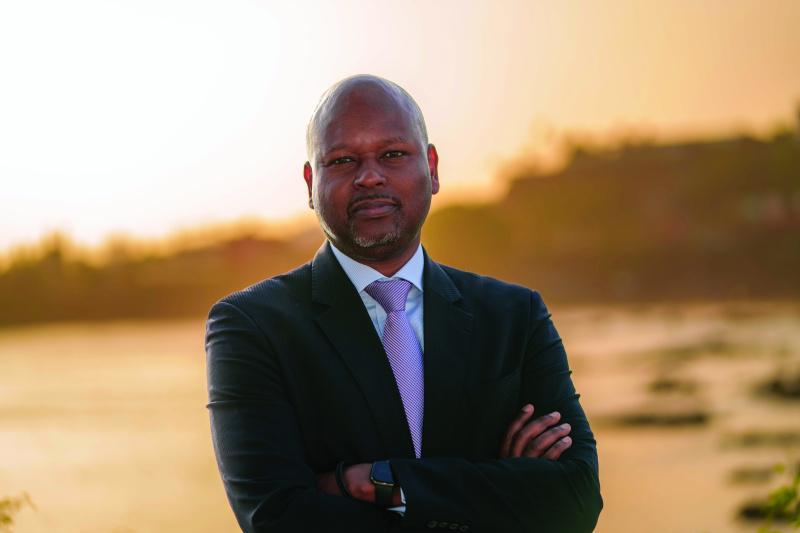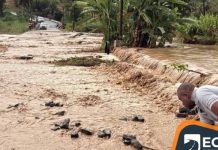
By ANDRÉ AMARAL
Africa-Press – Cape verde. Olivier Buyoya, Regional Director for West Africa at the International Finance Corporation (IFC), was in Cape Verde to present the Diagnosis on the National Private Sector. In conversation with Expresso das Ilhas, this official recognizes the importance that Tourism has in the national economy, but highlights the need to diversify the national economy.
I would start by asking what the general picture of the private sector in Cape Verde is.
The private sector in Cape Verde is very resilient and very promising. I think we have seen how quickly the country recovered from the COVID-19 crisis. We have a dynamic private sector. The government did its job, but the private sector was fundamental. And the private sector in Cape Verde is diverse. We have large foreign-owned companies in different sectors, mainly in the tourism sector. But the reality is that 75% of companies are SMEs that are operating in different value chains. These are the companies that create and maintain jobs. And these are the companies that will take advantage of the opportunities that present themselves in the country.
The private sector lives in a kind of tourism monoculture. Shouldn’t the economy, specifically the private sector, be more diversified?
Should be. And that is, in fact, one of the recommendations of the diagnosis. But before that, let’s also recognize and understand why. Since the 1990s, the Cape Verde government has created policies and frameworks to benefit and take advantage of these competitive advantages. This is why tourism is so developed. It is important to understand that in the early 1990s, there were only a few thousand tourists coming to Cape Verde. In 2022, it was almost a million, 785,000. Supported by a model that is the all-inclusive model. And it has supported the growth of the economy. This allowed the government to obtain revenue, invest in education, energy, etc. Therefore, the tourism sector has been extremely beneficial for the country. What made the country successful in the last 15 years is not what it will do in the next decade or the next two decades. This is why the country needs to diversify. First, in the tourism sector. In addition to the sun and sea model, there is high-value tourism that needs to be developed. Today, the tourism sector is concentrated on two islands when there are enormous opportunities on other islands for hiking, for water sports, for a number of other things. This is the high-level tourism sector. Then there are opportunities in terms of sustainability. The circular economy, for example. And then, after tourism, there are other potential sectors. The digital economy. The country invested massively in digital infrastructures. This is the time to reap the benefits of these sectors. We have the blue economy. Therefore, the country is really at a crossroads where it has to cement and consolidate the good reforms that have made the country a tourist destination while diversifying the tourism sectors and industry.
We have been talking about what is good in the report on the private sector in Cape Verde. What needs to be improved? What are the main difficulties that the report identifies?
The report is called a diagnosis. When we make a diagnosis, we take into account the pros and cons, strengths and weaknesses. And as you will have the opportunity to read it, we worked with different interested parties. We worked with representatives from the private sector, with our government counterpart, with our clients to really understand, and also to be able to benefit or develop these sectors, what needs to be done. Firstly, I think there is a general understanding that the country needs to continue to improve the overall business environment. In areas such as competitions, for example. The government has initiated a very ambitious policy to increase competition in key sectors. Introduce structures such as PPPs in the transport sector, in the electricity sector. Allow private sector entities to play a role when it is beneficial to the country. I refer to energy. Cape Verde is one of the countries where the cost of energy is the highest in the region.
He spoke about the digital economy. It is a bet that the government has been making in recent years. The technology parks in Praia and São Vicente are almost ready. Now the hardest part begins, which is making them attractive to large companies. What should be the path?
First, I think it is important to start with the competitive advantages that the country has. The digital infrastructure. As you know, Cape Verde is at the intersection of several submarine cables that connect Africa, Europe and South America. Secondly, there is the rule of law, political stability and security that the country enjoys. This is, in the West African region, extremely important compared to other countries. The third, and this is very important, is access capacity. Therefore, in terms of transport, I think it is easy to get to Cape Verde, Praia, Sal, get in and out. Now, since we have all this, it is important to also keep in mind that Cape Verde will be competing with larger markets. About 500 kilometers from here, we have Dakar, where technology parks are also being built, and we have Nigeria, Ghana and other countries. Therefore, the country will have to be able to take advantage of its strength, security, rule of law, connectivity and digital infrastructure to attract these companies, have the digital infrastructures to attract these companies. Of course, the weak point will always be the fact that it is a small market when compared to neighboring countries, but I think it is possible. The last important element is human capital. Investing in education, skills, especially in the digital aspect, the country must make progress in artificial intelligence, have an artificial intelligence policy, have the infrastructures that accompany it, data centers, etc., so that it can continue to increase competitive advantages while effectively competing with other countries in the region.
Digital nomads. Are they also a solution for the country?
It is one of the areas in which the country can effectively expand in terms of the tourism industry. The basis will continue to be the Sun and Beach model. But alongside it, among the areas in which the country can develop high-value tourism, this would be one of them.
Other countries have been implementing visas for digital nomads. Should Cape Verde also follow this path?
I think Cape Verde will benefit from this type of policy. Once again, given the competitive advantages that the country has, to increase the number of this type of tourism, facilitating access to the country is essential.
In the blue economy, fishing is also a bet that the government has been saying it wants to make. In your perspective, which path should Cape Verde follow?
The blue economy is about fisheries, but it is also about aquaculture. Regarding fisheries, I think that given the country’s geography and its history, it is important to approach it with care and pragmatism. Because on the one hand, fishing is a sector that makes the lives of many needy people in the country, so artisanal fishing is important for them. And it is important that the government supports this segment, for a formalization transition, so that they can truly earn a living and increase their income. But at the same time, there is also a serious impact, an adverse impact on the environmental side, on biodiversity. And that’s why it has to be approached carefully. It is a balancing act between truly supporting those in need and, at the same time, protecting biodiversity. And make sure this is done in a sustainable way. But in aquaculture I think there are huge opportunities that are still unexplored, and the government is really pursuing these opportunities.
Should the industrialization of fisheries involve aquaculture, or investment in larger vessels with greater fishing capacity?
That’s why I said it’s an extremely delicate issue. Because the last thing we want is to have uncontrolled and unsustainable industrialization. I think that Cape Verde, as a country, will not benefit from this type of approach. There has to be a framework. For example, there has to be a program to ensure, to quantify, to have data on the species of fish that are out there. Uncontrolled industrialization will not be beneficial for the country, nor for small-scale artisanal fishing. Aquaculture, on the other hand, is something, less harmful.
IFC has been supporting the private sector in Cape Verde. What investment has been made so far?
Firstly, allow me to highlight the fact that we opened our office in Praia just two years ago. We have been present on the ground and supported private sector investments in recent years from Dakar. If we look at our current portfolio, it is perfectly aligned with the opportunities that are mentioned in the report. Last year we were very proud to finance the VINCI group, which signed a concession with the government to manage the airports. Thus, we financed the renovation of seven airports and airfields on different islands. This is a testament to our strong commitment to supporting not only the transport sector, but also the tourism sector. In the tourism sector, we have traditionally supported large hotel groups. The Oásis Group is one of them. Today, our portfolio in Cape Verde went from 2 million dollars to 65 million. We will probably end the year at around 90 million. But in addition to financing, what we are also doing is supporting different companies and different sectors with what we call technical assistance. We will begin a series of training and sessions with commercial banks to support the promotion of financial literacy. To support SME segments, generally owned by women, who are in markets or commerce to obtain basic knowledge, basic training on how to manage accounts, so that they can be included in financial inclusion. We are working with the government on the privatization of certain sectors. We are also, with the World Bank, working in the energy sector. And we hope that, as we discussed previously, as the government continues to progress the agenda of introducing the private sector into key sectors through PPP, that we will be able to not only advise the government, but also invest alongside the entities of the private sector. Therefore, our portfolio is growing. Our ambition is aligned with the opportunities we see in Cape Verde, in the private sector.
Could Cape Verde benefit from the social and political unrest we are witnessing here in West Africa? Is this an opportunity for Cape Verde to show investors that they should invest here?
Yes, yes, absolutely. Ultimately, investors are very rational people. Therefore, they evaluate two things. Basically, the opportunity, the potential return, and the risk. And they make rational decisions. Of course, Cape Verde is considered a safe environment to invest. And that’s why domestic tourism is an opportunity. In Cape Verde, we have a competitive advantage in relation to all these markets. But at the same time, Cape Verde remains a small market. Therefore, companies that come here, in addition to tourism, will also need and want to target markets on the other side of the ocean, in West Africa. Thus, ultimately, Cape Verde will benefit from the rule of law, the democratic regime, etc. But it would be better if there was also stability on the other side, so that there could be connections. If Cape Verde is an island of stability in an ocean of instability, our capacity for growth is generally limited by this fact.
How is this report created? Is there a generic formula that applies to all countries? Or do we pay attention to the specificities of each country?
This is called the private sector diagnosis. Therefore, in each country, the diagnosis is different. But what we are trying to do, to continue in this direction, to make a medical analogy, the methodology is the same. So the way we approach the diagnosis is the same. But the results on the ground are different. The government, the private sector, SMEs all contribute to the report in terms of our reflection. Now, the result is the diagnosis, that is, the opportunities, challenges, constraints. But the most important part of the report is, in fact, the recommendations in terms of reforms or solutions that can be considered to take advantage of the opportunities. That is why, at the end of the report, there is a list of opportunity reforms. So, if we look at the tourism sector, we talk about normal domestic tourism, we talk about the Nordic sub-segment, we talk about the blue economy, we talk about the digital economy. For every opportunity there are reforms that the government can consider to support, to unlock those opportunities. And what we’re trying to do at IFC and the World Bank is position ourselves so that we can support the government if it’s willing to make those reforms. The last point, and what is really important here, is that the report’s diagnosis and conclusions are very much in line with PEDS 2. Therefore, it should be easier for us to work with the government in implementing these reforms. Some of them are already underway. This is why we are extremely hopeful that some of these opportunities will materialize in the very short term.
We also have to talk about the Green Economy and the energy transition in Cape Verde…
Currently, the percentage of renewable energy in the energy mix is around 17%. The government’s ambition is to reach 57% by 2030. That’s six years away. Yes, it’s totally possible. Because what is the alternative? The alternative is expensive energy, powered by heavy fuels. Given the configuration of the country, heavy fuel has to come from abroad and it is necessary to take into account transport costs, sometimes availability costs, etc., while the cost of renewable energy is falling, thanks to technology. Therefore, there is room for the country to gradually move from expensive heavy fuel and diesel electricity to renewable energy. To achieve this, the government needs to accelerate restructuring or reforms, such as the restructuring of Electra. Because if we have a sustainable public service company, it will be much easier to attract private investments under PPP models. And, once again, this is a good example of a reform that is already underway and supported by the World Bank. The World Bank is supporting Electra’s reform and there is no doubt that there will indeed be opportunities for private sector investment. At IFC we have already been contacted by a number of operators who intend to invest in renewable energy in Cape Verde.
The government has been selling its shares in some companies. It started with the banks. Electra is also one of the companies that the government is willing to privatize. Should the State completely withdraw from the capital of these companies that can be considered strategic for the country’s development?
One of the constraints that this report highlights is the need for the country and its government to increase the competitiveness of the economy. Now, the issue of privatization is always sensitive. We are not telling the government or recommending privatization as a one-size-fits-all solution. Not at all. What the report says is that there must be a broad policy to assess sector by sector which areas could be better served by the private sector compared to the public sector. And this assessment must be made by the government of Cape Verde. It’s not up to the World Bank, the IMF or anyone else to tell them that. And these sectors may be different in Cape Verde than in Senegal, than in Ghana. Secondly, once that decision is made at the government level, at the political level, we, the World Bank Group, can support the government to implement those decisions. For example, if the government decides that it is best for Cabo Verde Telecom to be partially or fully owned by a private operator, we have the capacity and experience to advise the government on this privatization, including how to identify a potential investor. This is exactly what was done at airports. The government took the decision that it would be better if the airports were managed under a public-private partnership by a private operator. VINCI was selected, and the company has, under the terms of the concession, the obligation to renovate these airports. We financed this project, this expansion. Similar models could be applied to ports, or maritime transport, etc. But it is extremely important to understand that the decision to bring the private sector into a given sector has to be a sovereign decision based on a model and an assessment of the pros and cons of private sector participation. And it also has implications in terms of tariffs, for example. And then, once that decision has been made, we support the government in its implementation. What we can say, and this is very important, is that it is not a one-size-fits-all model. And the model that everything has to be private doesn’t work, just as the model of having a significant part of the economy dominated by state entities doesn’t work either.
expressodasilhas
For More News And Analysis About Cape verde Follow Africa-Press





